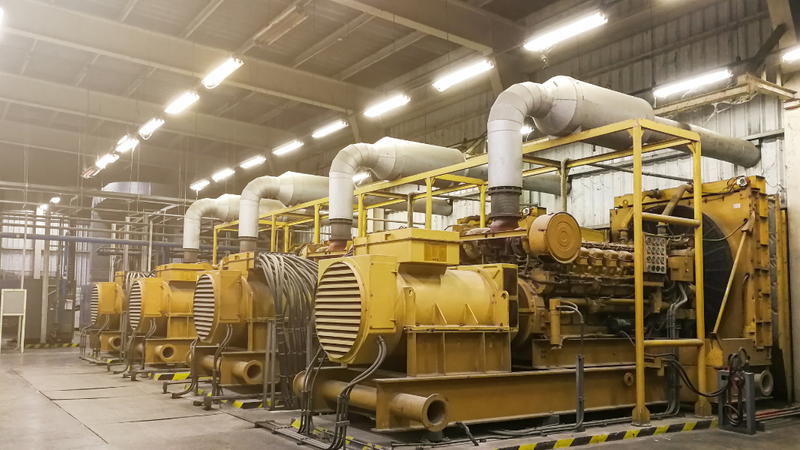Why Is Backup Power Important In Factories?
Backup power is crucial in any system that needs to run without interruption. In commercial operations, an interruption in service could lead to loss of output, income and reputation. Nowhere is this more critical than in manufacturing, which relies almost entirely on its production facilities.
This article was first published on
www.rowse-automation.co.ukThere are so many different elements in modern manufacturing that the failure of even one machine or one stage in a production process can lead to expensive downtime.
Some power failures automatically induce an emergency stop of manufacturing equipment, which means that any half-produced items have to be written off. The risk is even greater for just-in-time manufacturers and suppliers, where even the most minor power cut can have a dramatic effect on production.
Factory operations running 24/7 aren’t the only kind of activity that’s vulnerable to power failure. Any facility or business that relies on large machinery, including agriculture, mining and construction, is susceptible to power problems. These might include brownouts, harmonic distortions, voltage transients, surges and electrical distortions.
Nearly everything in modern life – particularly in Industry 4.0 – requires electricity in at least some part of its process, so you’ll find backup power systems in all kinds of environments. In industry, it’s not only your production machinery that needs backup power but also your computer systems and data servers. Here, uninterruptible power supplies (UPS) systems are vital since power loss to computer and server loads could result in component damage or critical loss of data.
Industrial plant equipment is usually designed for a lifespan of at least 15 years, while technological support systems evolve rapidly and quickly become obsolete. It’s possible that a single backup system will be inadequate for your needs and you’ll need a combination of power backups to keep all parts of your enterprise operational. For shutting down a production line safely in a power cut, you’ll need a different type of backup power to keep it running.
Generators
For industrial purposes, large-scale enterprises like manufacturing plants often require a more traditional solution in the form of a backup generator. Industrial generators are much more robust than a small commercial or residential type. They’re designed to withstand maximum demand for possibly extended periods if a power cut occurs. There’s no telling whether it’ll be for a few minutes, a few hours or a few days, so any backup generator needs the capacity to keep your business running reliably for unspecified periods of time. It must be capable of handling everything from your internet connection to your production machinery and packing processes, together with vital control devices.
Backup power generators can be fuelled by various means, including natural gas, diesel, hydrogen and solar power. Diesel is a popular choice because of its affordability, availability, efficiency and versatility, but these generators tend to be noisy and emit fumes. Natural gases like propane or liquefied petroleum offer a greener option but are more expensive and aren’t as powerful as diesel.
Hydrogen generators aren’t as readily available but have a reputation for safety and easy mobility. They’re low-cost, low-maintenance, energy-efficient, clean and emit no exhaust gases. Other types of industrial generators include portable, trailer-mounted versions and models that are quieter to run. These are more expensive but popular for reducing noise in the workplace. This is particularly useful for enterprises operating in retail parks or near residential areas.
Uninterruptible Power Supplies
A UPS is designed to provide comprehensive backup power in the event of mains power failure. They offer a modular solution that protects equipment and machinery from suffering damage from outages. In these circumstances, the UPS cuts in almost instantaneously, powering equipment so that systems and processes continue to run without serious interruption. There are all kinds of UPS systems available, which offer significant variations in functionality and design. How long they can continue to power your equipment depends on their battery capacity. Other variables include cost and the ability of any given UPS to improve power quality.
Choosing An Appropriate Backup Power Supply
Selecting the most appropriate generator or UPS for your factory depends on several contributory factors. You’ll need to carefully assess the facility’s existing power supply, its load demands and your overall energy management capacity. Do you have to take any sensitive equipment loads into account? What proportion of the total facility load does this represent? Is your factory an on-demand manufacturing facility?
UPS systems generally require only minimal maintenance, with the greatest issue for ensuring their overall effectiveness being battery health. Good battery maintenance is essential if you’re to be confident that the UPS can provide the necessary equipment run time. Generators require regular preventive maintenance to ensure they don’t fail in an emergency situation. This includes weekly, monthly and annual inspections and tasks such as:
cleaning and changing oil lines and filters
checking cables, electrical connections and batteries
topping up oil and coolant levels
running load tests
You’ll also need to determine whether you need an automatic transition from mains supply to a generator or whether the electricity supply must be uninterrupted. If instantaneous transition is necessary, but uninterruptible supply is not so critical, a generator may be the best solution.
If uninterrupted supply is crucial, one or more UPS units can be installed. These could be instead of or in addition to a generator, depending on how much power you need and for how long. In most large-scale operations, generators are necessary for long-term support, but UPS systems can be complementary in supporting electronic devices and business systems.
Understanding why backup power is so important in factories will underscore your decision on how best to protect your assets. You’ll need a system that kicks in as rapidly as possible when you have a power cut – one that offers you protection against equipment damage arising from power quality issues.
